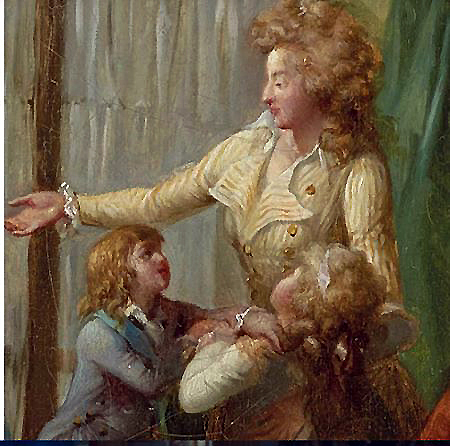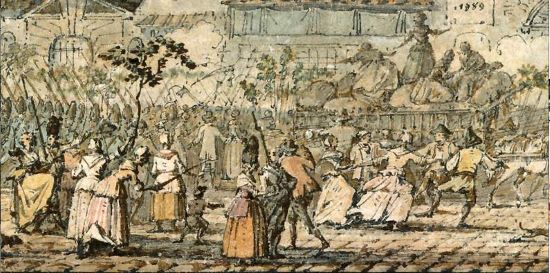* * *
Monday, February 29, 2016
4.2. THE CURTAIN FALLS
* * *
Sunday, February 28, 2016
MARIE-ANTOINETTE BREAKS RULES THAT SHE DOES NOT UNDERSTAND
Marie-Antoinette, Archduchess of Austria, age 12, 1767-1768 / zoom
-- Madame Campan, p.11
...felt that her pedigree let her ignore court codes...
"Fix all that as you want to: but don't think that a queen, born an archduchess of Austria, will give it the support and interest of a Polish princess,* become queen of France."
Marie-Antoinette with a Rose by Elisabeth Vigée-Lebrun, 1783
- As nobles, they shared kings' gifts of lands, posts, honors etc. with their clans, giving them temporary access to power without the risk of rebellion.
- The institution evolved: Louis XIV's much stronger monarchy made revolt impossible and Louis XV's favorites of commoner origin (Jeanne Poisson ennobled as the Marquise de Pompadour and Jeanne Bécu ennobled as the Countess du Barry) had no traditional entourage to favor.
- They were also lightning rods whose extravagance concentrated popular fury on themselves and away from the ruler, who was thought fatherly but misled.
-- La Reine et la favorite by Simone Bertière, 2000, pp. 347-354
The portrait on the left, of 1776, shows the codes of the court. That on the right (undated) has a much simpler coiffure and the uncovered breast signals freedom from codes.
Film for television, gone from the web
Saturday, February 27, 2016
"LET THEM EAT CAKE..."
- "What is this, Versailles?" my father would say when we left too many lights turned on.
- Movie, documentary, musical:
- Marie-Antoinette by Sophie Coppola, 2006
- The true story of a woman whose need to consume is endless and who calls her mansion "Versailles," 2012
- Broadway musical, 2025
Trailer
- "Barack Antoinette," a columnist called Obama* to castigate a fête.
- Trump's favoritism, building a giant ballroom and over-the-top festivity while cancelling programs that help the poor, have made the allusion constant:
Poster by the press of the governor of California / zoom (please scroll down)
- "Versailles at discount" is said of his gold decor.
-- The Meidas Touch podcast
# # #
- At a "No Kings" protest by Americans in Paris:
"No Kings" demonstration in Paris, Oct 25, 2025
Thursday, February 25, 2016
THE SPIRIT OF THE ROYAL COURT
THIS MASTERPIECE SUGGESTS THE EPHEMERAL NATURE OF LOVE, PLEASURE AND LIFE...
...but usually the style extolled sociability or the arts in an imaginary setting, with no further message:
 |
Die Freuden des Landlebens ("The Joys of Country Life") by Jean-Baptiste Pater, toward 1730 |
La Camargo danse by Nicolas Lancret vers 1730 / zoom
It might be erotic...
The Swing, by Jean-Honoré Fragonard, toward 1768 / zoom
Le Verrou ("The Lock") by Jean-Honoré Fragonard, toward 1770
Les Quatre Saisons : L'hiver ("The Four Seasons: Winter") by François Bourcher, 1755 / zoom
Jeune berger dans un paysage ("Young shepherd in the countryside") by François Boucher, no date / zoom
La Petite Laitière ("The Little Milkmaid") by François Boucher, 1766 / zoom
Wednesday, February 24, 2016
A BUBBLEHEAD RISES TO THE OCCASION
THE QUEEN'S COURAGE BEFORE A CROWD WANTING TO KILL HER CONFRONTS HER FRIVOLOUS IMAGE
-- Pages based on Histoire de la Révolution française, Jules Michelet's classic (1853).
Fuite de Passy à Versailles, a famous print (Passy is a wealthy suburb on the route to Versailles) / zoom
- Lafayette,* Head of the National Guard, tries ineffectively to stop them, then with his men tags along.
 |
These photos and the next come from La Révolution française by Robert Enrico, 1989 |
The child is imaginary but the drumbeat's stirring call was real.
- Men disguised as women are said to join in.
 |
| Internet, no source named |
- The march is much tougher than the picture and movie show. The crowd walks the 12 miles to Versailles in mud, under cold October rain.
- Thousands of women arrive at Versailles toward 16h, Lafayette and the Guard a few hours later.
- The king receives a delegation of women (one faints from emotion on seeing him). He agrees to send grain to Paris and to sign the Declaration of the Rights of Man and the Citizen, and said he would think about coming to Paris.
- The throng camps out in the palace's huge courtyard:
- Chambermaids lock the door and help Marie-Antoinette throw on a dress:
They flee by a secret passage that leads to the king's room, but he has left to look for them. They rush through the palace to find him. A locked door adds to the panic: It is five minutes before a servant hears the terrified pounding.
- Two guards who try to protect the queen are killed:
 |
"Massacre of a Guard at the Queen's Apartment, by brigands" print by J-F Janinent / zoom
- The queen and the chambermaids finally find the king, the children, their governess and Lafayette, in the salon that looks out on the courtyard:
Le General La Fayette met en garde [warns] le Roi et la Reine by Jean-Frédéric Shall, before 1825, zoom

-- Michelet
- His carriage leads the march, to drumbeats and the shooting of muskets. The mob is so close to the coach that it sways from side to side, carrying ahead of it the heads of the slaughtered guards on pikes. The court follows in a hundred coaches:
-- The account below comes from the memoir of Madame Campon,whose sister was present.
 |
| Zoom |
 |
La Fuite de Louis XVI by Viktor Lazarevski, 2013 / Youtube |
Louis XVI entre à Paris, le 6 octobre 1789 by J.F.J. Swebach, 1789 / zoom


.jpg)




.jpg)



.jpg)
.jpg)
.jpg)
.jpg)
.jpg)









.jpg)



.jpg)


















